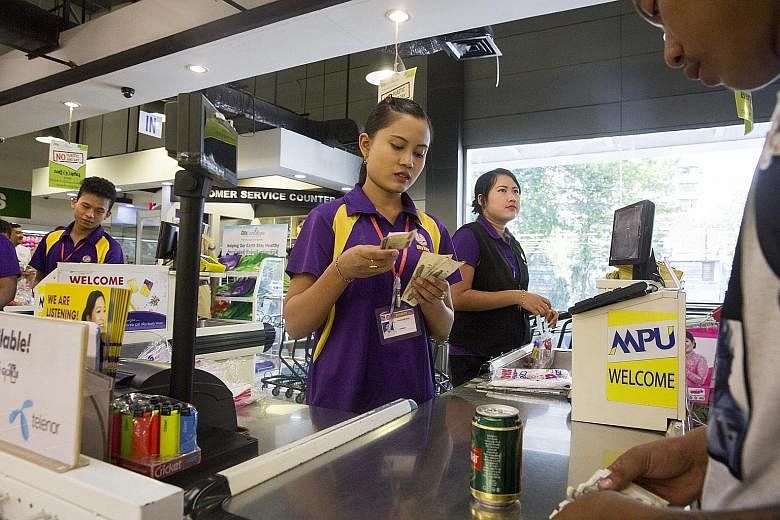The year was 1997 when Mr Argus Ang stocked up on palm leaf fans to get himself though Yangon's searing summer. Electricity was intermittent then in a military-ruled Myanmar weighed down by Western sanctions. Cars were a luxury and petrol, rationed.
Strangely enough, there were many shops selling car batteries.
The curious business administration graduate in his 20s from the National University of Singapore soon found out why - batteries were connected to inverters to keep electrical items running during blackouts.
"One 12 volt battery can power four flourescent bulbs and three fans for three to four hours," he reels off, in a testament to his two decades of experience starting and growing an educational and institution management business.
Myanmar's generals were so fearful of student unrest, they closed down university dorms and dispersed students to classes on the city outskirts.

Many undergraduates were learning through cassette tapes and home-based assignments, emerging with paper credentials but unfit for employment.
That was where Mr Ang found his niche: He offered Singapore-style education to middle-class parents anxious about their children's future.
From a school catering to 17 students in Mandalay, Myanmar's second-largest city, his business grew.
Now it includes two private schools, three early childhood centres and a professional development and higher learning institute.
Mr Ang, still in his mid-40s, already heads a group of companies called RVi that provides education and training services, including in Cambodia, Laos, Vietnam and Thailand.
But he does not take it for granted that he knows exactly what his customers want.
In May 2008, when Cyclone Nargis hit Myanmar, he could not decide whether to call off Cambridge IGSCE examinations scheduled in his Yangon institute.
He got his staff to call up some 30 students for their opinions. With their blessing, the exam went ahead.
The students walked past roads blocked by uprooted trees and collapsed houses to the examination hall.
-
Tips
-
... FROM ARGUS ANG
• Do your homework. For example, Yangon, the commercial capital, is not Myanmar. Visit other areas to understand the people and local realities.
• Be culturally sensitive. For example, folding your arms is a sign of respect. And being present is the best way to show your commitment to business partners and customers.
... FROM IE SINGAPORE
• Undertake due diligence when entering a new market. In Myanmar, legal and financial frameworks are still being developed. Firms must track changes in the regulatory climate and develop business models or products accordingly. Take a long-term investment view.
• Singapore firms can ride on our strong brand name and credibility to gain access. But they must offer the management expertise and technological know-how that Myanmar firms are seeking. Partnerships with firms there can help you with local customs and regulations, and access to local networks.
• Think about meaningful job creation for the country and providing opportunities for skills upgrading. Include an environmentally and socially sustainable growth path in your business proposals.
The immediate past president of the Singapore Association of Myanmar receives visits about once or twice a week from would-be investors seeking market insight.
The queries he got surged from 2011, after an election ushered in a quasi-civilian government headed by reformist former general Thein Sein.
Some of these people were keen on the "cheap deals", hoping for immediate profit in what is often labelled Asia's last frontier.
"I tell them, 'don't look at Myanmar as a place to make a quick buck'," he says. "I'm generally positive about Myanmar. But when you come here, there are operational realities that you have to understand." While the banking sector is fast developing, for example, most transactions are still done with cash. Big purchases involve thick wads of kyat.
Mr Ang, who speaks fluent Burmese, looks right at home in the traditional longyi-and-slippers ensemble. But his wife lives and works in Singapore. Both shuttle between Singapore and Myanmar, spending an average of five or six days together each month, and recently celebrated their 12th anniversary.
Mr Ang is looking forward to expanding his operations. "Myanmar has one of the youngest populations in the region. So we hope to grow more schools, institutions and to run more programmes... And we will continue to learn," he says.
Plus, living in Myanmar offers him small luxuries. "Having time to sit down on a low stool, have coffee and tea and talk about things" for instance. "In Singapore, it's very rare to have that kind of (long) discussion," he says.


